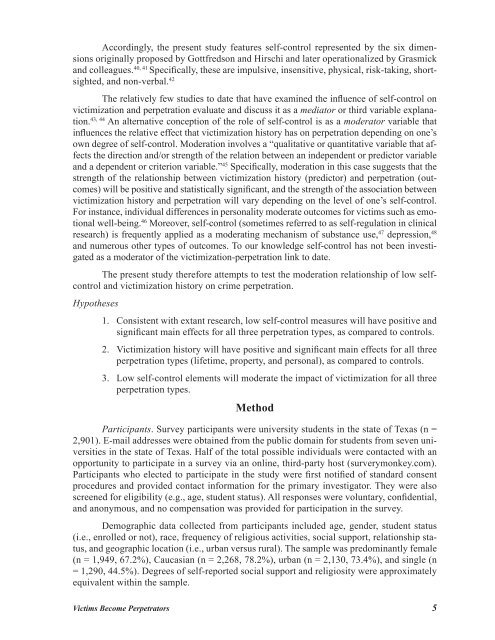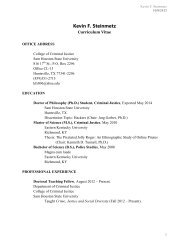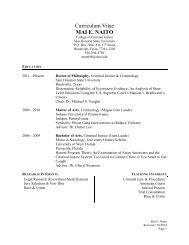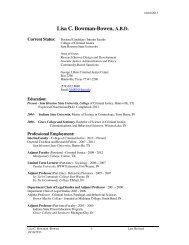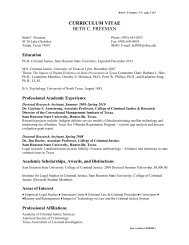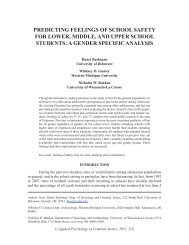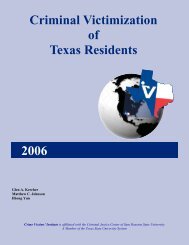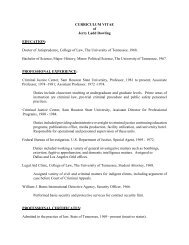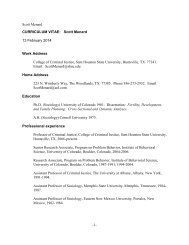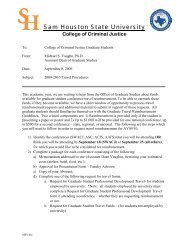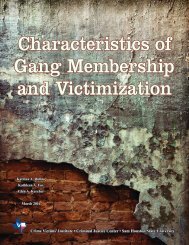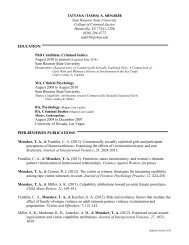Understanding How Some Victims Become Perpetrators: Self ...
Understanding How Some Victims Become Perpetrators: Self ...
Understanding How Some Victims Become Perpetrators: Self ...
Create successful ePaper yourself
Turn your PDF publications into a flip-book with our unique Google optimized e-Paper software.
Accordingly, the present study features self-control represented by the six dimensionsoriginally proposed by Gottfredson and Hirschi and later operationalized by Grasmickand colleagues. 40, 41 Specifically, these are impulsive, insensitive, physical, risk-taking, shortsighted,and non-verbal. 42The relatively few studies to date that have examined the influence of self-control onvictimization and perpetration evaluate and discuss it as a mediator or third variable explanation.43, 44 An alternative conception of the role of self-control is as a moderator variable thatinfluences the relative effect that victimization history has on perpetration depending on one’sown degree of self-control. Moderation involves a “qualitative or quantitative variable that affectsthe direction and/or strength of the relation between an independent or predictor variableand a dependent or criterion variable.” 45 Specifically, moderation in this case suggests that thestrength of the relationship between victimization history (predictor) and perpetration (outcomes)will be positive and statistically significant, and the strength of the association betweenvictimization history and perpetration will vary depending on the level of one’s self-control.For instance, individual differences in personality moderate outcomes for victims such as emotionalwell-being. 46 Moreover, self-control (sometimes referred to as self-regulation in clinicalresearch) is frequently applied as a moderating mechanism of substance use, 47 depression, 48and numerous other types of outcomes. To our knowledge self-control has not been investigatedas a moderator of the victimization-perpetration link to date.The present study therefore attempts to test the moderation relationship of low selfcontroland victimization history on crime perpetration.Hypotheses1. Consistent with extant research, low self-control measures will have positive andsignificant main effects for all three perpetration types, as compared to controls.2. Victimization history will have positive and significant main effects for all threeperpetration types (lifetime, property, and personal), as compared to controls.3. Low self-control elements will moderate the impact of victimization for all threeperpetration types.MethodParticipants. Survey participants were university students in the state of Texas (n =2,901). E-mail addresses were obtained from the public domain for students from seven universitiesin the state of Texas. Half of the total possible individuals were contacted with anopportunity to participate in a survey via an online, third-party host (surverymonkey.com).Participants who elected to participate in the study were first notified of standard consentprocedures and provided contact information for the primary investigator. They were alsoscreened for eligibility (e.g., age, student status). All responses were voluntary, confidential,and anonymous, and no compensation was provided for participation in the survey.Demographic data collected from participants included age, gender, student status(i.e., enrolled or not), race, frequency of religious activities, social support, relationship status,and geographic location (i.e., urban versus rural). The sample was predominantly female(n = 1,949, 67.2%), Caucasian (n = 2,268, 78.2%), urban (n = 2,130, 73.4%), and single (n= 1,290, 44.5%). Degrees of self-reported social support and religiosity were approximatelyequivalent within the sample.<strong>Victims</strong> <strong>Become</strong> <strong>Perpetrators</strong> 5


